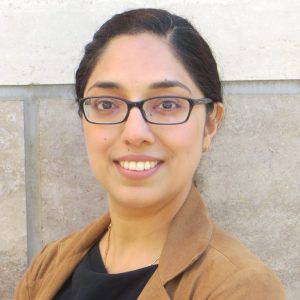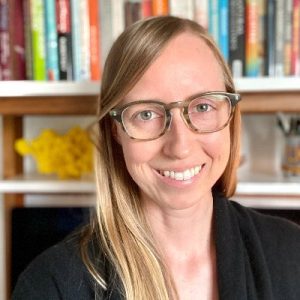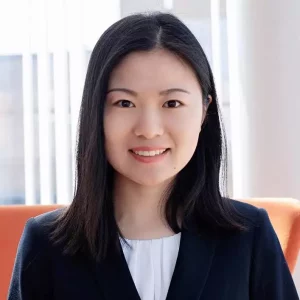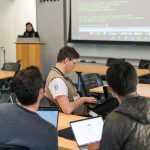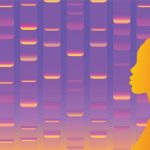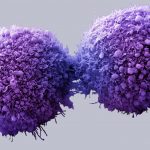2024-2025 WIES Fellows
Judee Sharon
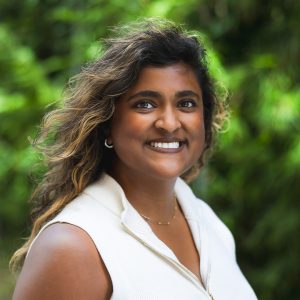 Judee Sharon is a Cal alumna with a Ph.D. from the University of Minnesota. She is currently Co-founder and CEO of KuriBio, an early stage biotech company. At KuriBio, Judee has developed a nanotech-based platform for early detection of cancers that are typically detected at later stages and that have a high mortality rate, such as pancreatic cancers. Her technology is based on liposomal nanoparticles that quantitatively indicate the presence of a growing tumor. Judee envisions being able to multiplex her platform for concurrent detection of various cancers in one single test. The WIES fellowship will provide Judee with business mentorship, lab space, and funds for additional R&D to de-risk her technology.
Judee Sharon is a Cal alumna with a Ph.D. from the University of Minnesota. She is currently Co-founder and CEO of KuriBio, an early stage biotech company. At KuriBio, Judee has developed a nanotech-based platform for early detection of cancers that are typically detected at later stages and that have a high mortality rate, such as pancreatic cancers. Her technology is based on liposomal nanoparticles that quantitatively indicate the presence of a growing tumor. Judee envisions being able to multiplex her platform for concurrent detection of various cancers in one single test. The WIES fellowship will provide Judee with business mentorship, lab space, and funds for additional R&D to de-risk her technology.
Mimi Guo
 Mimi Guo is currently a postdoc in the Schaffer lab at UC Berkeley, where she engineers new AAV for enhanced gene delivery in the central nervous system. Mimi has a diverse educational background, including prior experience in mechanical engineering. Her goal is to develop therapeutic approaches for neurological diseases by evolving AAV to genetically manipulate specific cell types in the CNS. During the WIES fellowship year, Mimi aims to identify and optimize AAV variants through directed evolution and machine learning. She will also work on developing therapeutic payloads and validate their effects on human brain samples. Successful completion of the project will yield new treatment strategies for neurological diseases.
Mimi Guo is currently a postdoc in the Schaffer lab at UC Berkeley, where she engineers new AAV for enhanced gene delivery in the central nervous system. Mimi has a diverse educational background, including prior experience in mechanical engineering. Her goal is to develop therapeutic approaches for neurological diseases by evolving AAV to genetically manipulate specific cell types in the CNS. During the WIES fellowship year, Mimi aims to identify and optimize AAV variants through directed evolution and machine learning. She will also work on developing therapeutic payloads and validate their effects on human brain samples. Successful completion of the project will yield new treatment strategies for neurological diseases.
Carlotta Ronda
 Carlotta Ronda is an IGI Investigator on the microbiome editing team. Her proposal is centered around her demonstrated expertise in editing microbes, and her idea of developing therapies for eye diseases by editing microbes already present in the eye microbiome to continuously deliver therapeutic molecules to the eye's surface. The first product coming out of her platform would be a therapy for glaucoma. In the WIES fellowship year Carlotta would develop an early proof-of-concept of the ocular microbiome editing technique using fluorescent reporters to demonstrate editing capacity while also optimizing delivery methods of engineered microbes for stable colonization of the eye.
Carlotta Ronda is an IGI Investigator on the microbiome editing team. Her proposal is centered around her demonstrated expertise in editing microbes, and her idea of developing therapies for eye diseases by editing microbes already present in the eye microbiome to continuously deliver therapeutic molecules to the eye's surface. The first product coming out of her platform would be a therapy for glaucoma. In the WIES fellowship year Carlotta would develop an early proof-of-concept of the ocular microbiome editing technique using fluorescent reporters to demonstrate editing capacity while also optimizing delivery methods of engineered microbes for stable colonization of the eye.
Julia Turnšek
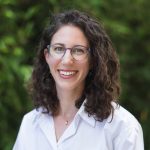 Julia Turnšek recently completed her Ph.D. in the Savage lab at the IGI and UC Berkeley. As a biochemist and microbiologist with a drive to build biotechnologies for sustainability, Julia is applying her expertise towards the global problem that plants cannot produce essential nutrients they need to grow — these nutrients (nitrogen, phosphorus, and potassium) need to be externally applied via fertilizer. Current production methods, including synthetic chemistry and mining, are environmentally destructive, polluting, and costly. Inspired by nature’s solution to this problem, she envisions creating a biological soil amendment to unlock these nutrients, which are widely present in soils yet in forms that are inaccessible to plants. This technology would eliminate the need for synthetic fertilizer inputs, and would contribute to reducing fertilizer overuse. She believes the WIES program is a perfect venue to generate proof-of-concept data and to gain entrepreneurial and business acumen.
Julia Turnšek recently completed her Ph.D. in the Savage lab at the IGI and UC Berkeley. As a biochemist and microbiologist with a drive to build biotechnologies for sustainability, Julia is applying her expertise towards the global problem that plants cannot produce essential nutrients they need to grow — these nutrients (nitrogen, phosphorus, and potassium) need to be externally applied via fertilizer. Current production methods, including synthetic chemistry and mining, are environmentally destructive, polluting, and costly. Inspired by nature’s solution to this problem, she envisions creating a biological soil amendment to unlock these nutrients, which are widely present in soils yet in forms that are inaccessible to plants. This technology would eliminate the need for synthetic fertilizer inputs, and would contribute to reducing fertilizer overuse. She believes the WIES program is a perfect venue to generate proof-of-concept data and to gain entrepreneurial and business acumen.

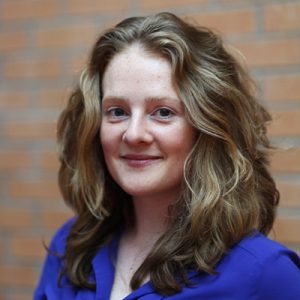 Derfogail Delcassian is an Assistant Professor in the Department of Bioengineering at UC Berkeley. She is developing a new approach for long-term genetic reprogramming using mRNA for transient protein expression to regulate the epigenome. As a WIES fellow, she plans to pilot her idea using a melanoma model to understand how tumor immune cell behavior changes following receiving mRNA that encodes epigenetic modifying enzymes. In this study, Delcassian will examine the role of macrophages in the immune response to cancer. If successful, this would be a new platform technology bridging the gap between the transient nature of mRNA therapeutics and the permanence of genome editing and could be used to treat many diseases and apply to a number of fields including tumor biology and immunology.
Derfogail Delcassian is an Assistant Professor in the Department of Bioengineering at UC Berkeley. She is developing a new approach for long-term genetic reprogramming using mRNA for transient protein expression to regulate the epigenome. As a WIES fellow, she plans to pilot her idea using a melanoma model to understand how tumor immune cell behavior changes following receiving mRNA that encodes epigenetic modifying enzymes. In this study, Delcassian will examine the role of macrophages in the immune response to cancer. If successful, this would be a new platform technology bridging the gap between the transient nature of mRNA therapeutics and the permanence of genome editing and could be used to treat many diseases and apply to a number of fields including tumor biology and immunology. 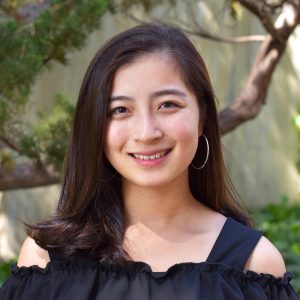 Yue Clare Lou is currently completing her Ph.D. in the laboratory of Jill Banfield, Director of Microbiology at the IGI, before starting her fellowship in Fall. Lou studies the relationship between the gut microbiome and infant health. She recently led the development of a gut microbiome diagnostic platform and has published a proof-of-concept preprint in which she demonstrated that functional predictions from metagenomic analyses of infant microbiomes could be tested and recreated experimentally using cultivated microbiomes. Specifically, her work describes how microbial communities, which are specific to each individual, work together to metabolize oligosaccharides in human milk. Her work emphasizes the importance of supplementing individualized interventions as each infant (and also adult!) is colonized by a unique collection of gut microbes. As a WIES fellow, Clare will expand the platform she developed to identify additional infant gut microbial markers that can be leveraged to guide personalized microbiome interventions. Learn more about Clare in our Meet an IGI Scientist
Yue Clare Lou is currently completing her Ph.D. in the laboratory of Jill Banfield, Director of Microbiology at the IGI, before starting her fellowship in Fall. Lou studies the relationship between the gut microbiome and infant health. She recently led the development of a gut microbiome diagnostic platform and has published a proof-of-concept preprint in which she demonstrated that functional predictions from metagenomic analyses of infant microbiomes could be tested and recreated experimentally using cultivated microbiomes. Specifically, her work describes how microbial communities, which are specific to each individual, work together to metabolize oligosaccharides in human milk. Her work emphasizes the importance of supplementing individualized interventions as each infant (and also adult!) is colonized by a unique collection of gut microbes. As a WIES fellow, Clare will expand the platform she developed to identify additional infant gut microbial markers that can be leveraged to guide personalized microbiome interventions. Learn more about Clare in our Meet an IGI Scientist 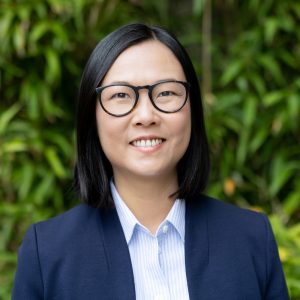 Alice Refermat is currently the Director of the Center for CRISPR Target Discovery at the IGI. She co-invented a platform technology, ZFPOFF, for heritable epigenetic gene repression using artificial zinc-finger proteins. As a WIES fellow, she proposes to use this technology to develop a treatment for KRAS-based cancers. Alterations in the KRAS gene are found in 23 percent of all adult cancers, including a high percentage of lung, pancreatic, and colorectal cancers. Several cancer-causing mutations in KRAS still have no specific drug available, leaving patients with limited treatment options. If successful, Refermat believes this technology could be translated to treat other cancers associated with other cancer-driving genes that currently lack specific treatments. Learn more about Alice in our Meet an IGI Scientist
Alice Refermat is currently the Director of the Center for CRISPR Target Discovery at the IGI. She co-invented a platform technology, ZFPOFF, for heritable epigenetic gene repression using artificial zinc-finger proteins. As a WIES fellow, she proposes to use this technology to develop a treatment for KRAS-based cancers. Alterations in the KRAS gene are found in 23 percent of all adult cancers, including a high percentage of lung, pancreatic, and colorectal cancers. Several cancer-causing mutations in KRAS still have no specific drug available, leaving patients with limited treatment options. If successful, Refermat believes this technology could be translated to treat other cancers associated with other cancer-driving genes that currently lack specific treatments. Learn more about Alice in our Meet an IGI Scientist 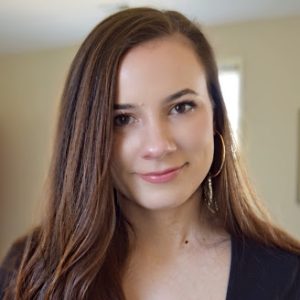 Kelsey Hern is currently completing her Ph.D. in Prof. Adam Arkin’s lab at UC Berkeley before starting her fellowship in Fall. Hern is working on the identification of airway microbiome constituents that require only a single dose to stably colonize the lung and act as probiotics by preventing death from respiratory infections. As a WIES fellow, she proposes to build on her dissertation work to develop a platform that will enable the prevention and continuous monitoring of various respiratory diseases. She plans to pilot this idea in lung cancer. Hern is excited to be colleagues with the team at IGI’s Berkeley Initiative for Optimized Microbiome Editing (BIOME), which will be extremely beneficial to achieving her goals. Learn more about Kelsey in our Meet an IGI Scientist
Kelsey Hern is currently completing her Ph.D. in Prof. Adam Arkin’s lab at UC Berkeley before starting her fellowship in Fall. Hern is working on the identification of airway microbiome constituents that require only a single dose to stably colonize the lung and act as probiotics by preventing death from respiratory infections. As a WIES fellow, she proposes to build on her dissertation work to develop a platform that will enable the prevention and continuous monitoring of various respiratory diseases. She plans to pilot this idea in lung cancer. Hern is excited to be colleagues with the team at IGI’s Berkeley Initiative for Optimized Microbiome Editing (BIOME), which will be extremely beneficial to achieving her goals. Learn more about Kelsey in our Meet an IGI Scientist 